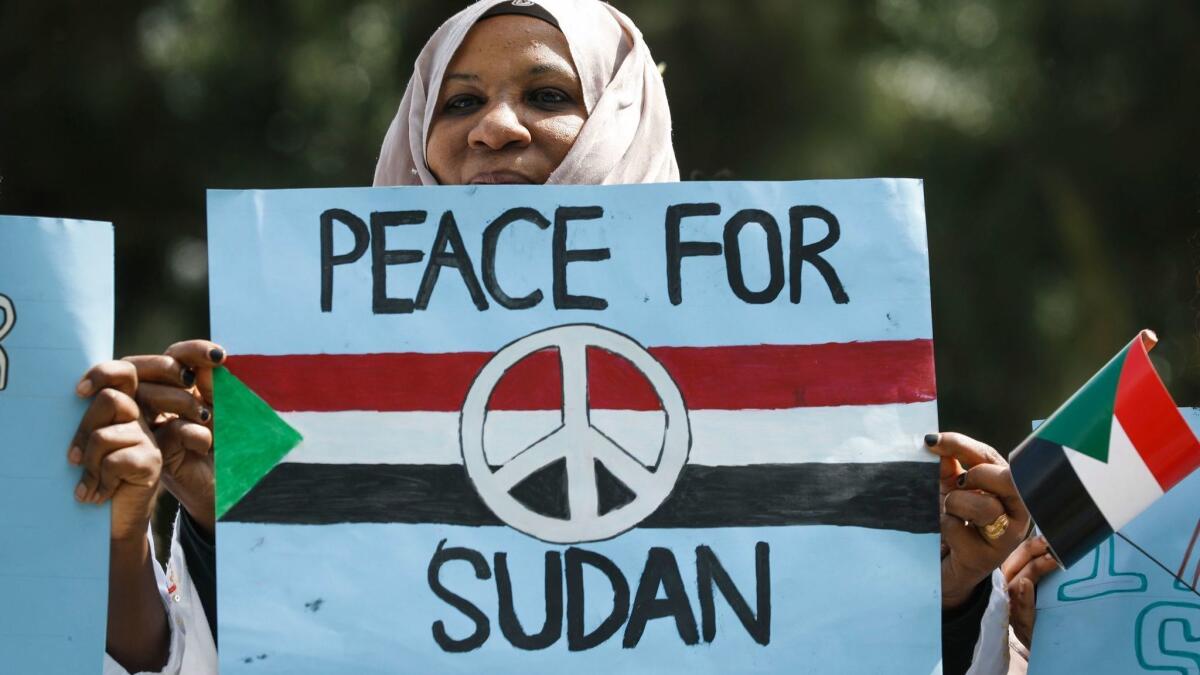Women are behind the most successful uprisings of 2019. Here’s why

- Share via
We will remember 2019 as a year of uprisings. In over a dozen countries on five continents, people have risen up to confront economic inequality and even the most repressive governments. These mobilizations are answering the question of how to tackle ascendant right-wing authoritarianism — and women have been at the heart of it all.
In part, that’s because women know well the consequences of living under these draconian governments. Far-right politicians and groups have repeatedly sought to win political support by promising to keep women in their place. In the lead-up to their elections, Brazilian President Jair Bolsonaro touted his opposition to a law imposing penalties for gender-motivated killings, and Philippine President Rodrigo Duterte crassly joked about possibly participating in a gang rape.
Right-wing forces promote a toxic brand of masculinity that defines manhood through violence and aggression, promising men a slice of patriarchal power in exchange for backing authoritarian rule. They relegate women to silence and submission and force LGBTIQ people into hiding. They have targeted female human rights activists who defy patriarchal norms with harassment, criminalization and even murder.
But the leadership we’ve seen from women during uprisings is not just a defensive reaction against these threats. Women-led, feminist organizing has become a vital, effective strategy to confront authoritarian power — partly because women tend to lead nonviolent, inclusive movements that often work to bring about political change against authoritarian regimes.
Nonviolent movements have been twice as effective at achieving their goals as violent uprisings, succeeding more than 50% of the time, according to a 2008 study of more than 320 uprisings from 1900 to 2006. And when women are at the forefront, mass mobilizations are more likely to be peaceful, another study concluded. Among nonviolent movements, more than 60% featured women’s organizations that formally called for peace, compared with only 35% among violent campaigns.
In Sudan, young activist Alaa Salah climbed atop a car this year to lead protest chants and inspire millions. Women — who bore the brunt of Sudanese dictator Omar Bashir’s repression, including policing women’s behavior and consigning them to second-class citizenship — made up two-thirds of protesters. Persisting in the face ofassault, arrest and sexual violence at the hands of government forces, they insisted on nonviolence, ultimately ousting Bashir and overturning his repressive orders.
In Colombia, the initial trigger for the biggest mobilizations the country has seen in decades was a rumor of government cuts to pensions. Rights activist Stella Duque, who founded the peace-building organization Taller de Vida, immediately knew that the Colombia uprising was not just about pension cuts.
The fury grew from years of thwarted opportunities for real peace. It erupted over the government’s failures to effectively implement a historic 2016 peace agreement or to address the needs of those who had suffered through the worst of the violence: former child soldiers, survivors of wartime sexual violence, and indigenous and black communities.
A hallmark of women’s organizing is making sure no one is left behind. For years, Duque has focused on providing healing services through art therapy and support groups for those most impacted by violence, especially young people and demobilized child soldiers. Currently, she’s using her networks and the trust she’s built among those marginalized communities to bring their voices into the protests.
Feminist uprising is also an antidote to authoritarianism because women’s movements provide the infrastructure needed to sustain grass-roots organizing.
For years, Yanar Mohammed of the Organization of Women’s Freedom in Iraq has trained and mobilized a nationwide network of activists for democracy and gender justice in Iraq — while trying to meet women’s needs that include shelter, job training and know-your-rights workshops.
The Iraqi people’s outrage at their corrupt, undemocratic government has resulted in the country’s largest demonstrations since 2003. When the protests began in October, Mohammed and other activists were ready to draw on their networks and tools. They shuttled people to and from protests and disseminated food and emergency supplies. To guide newly mobilized, less-seasoned activists, they set up tents in Baghdad’s Tahrir Square to educate people and explain tactics — and distribute brochures about feminism and human rights.
Iraq’s protests have already compelled the country’s prime minister to resign. Further victories, such as reforms to combat corruption and sectarianism, will require long-term organizing. Grassroots Iraqi women’s groups have been building channels to keep people engaged through work that began long before the uprising, including broadcasting radio programs about rights and democracy and hosting community-building gatherings.
Finally, feminist movements stand for something that right-wing authoritarians fear: the end of patriarchy. Together, women are rewriting the rules that allocate power to some and suppress others based on restrictive gender norms. They are creating inclusive communities where people of all genders and identities can live freely, assured of their rights. That’s more than a beautiful dream. It’s a blueprint for a successful uprising.
Yifat Susskind is executive director of Madre, a human rights organization that partners with women’s groups facing war and disaster worldwide.
More to Read
A cure for the common opinion
Get thought-provoking perspectives with our weekly newsletter.
You may occasionally receive promotional content from the Los Angeles Times.






